As some of you know, Shunji Japanese Cuisine recently debuted at #10 on Jonathan Gold’s 101 Best Restaurants list (may require L.A. Times subscription; free preview here). I’ve been needing an excuse to go back, so when Chris Hei told me the week before that he had planned on taking a friend to Shunji last Friday, I decided to shoehorn my way into his reservation. We arrived to a full house–even the tables were occupied–and were greeted warmly by Yuko, Shunji, and the rest of his staff. The specials board was chock full of exotic fish, and we couldn’t wait for our omakase to begin.
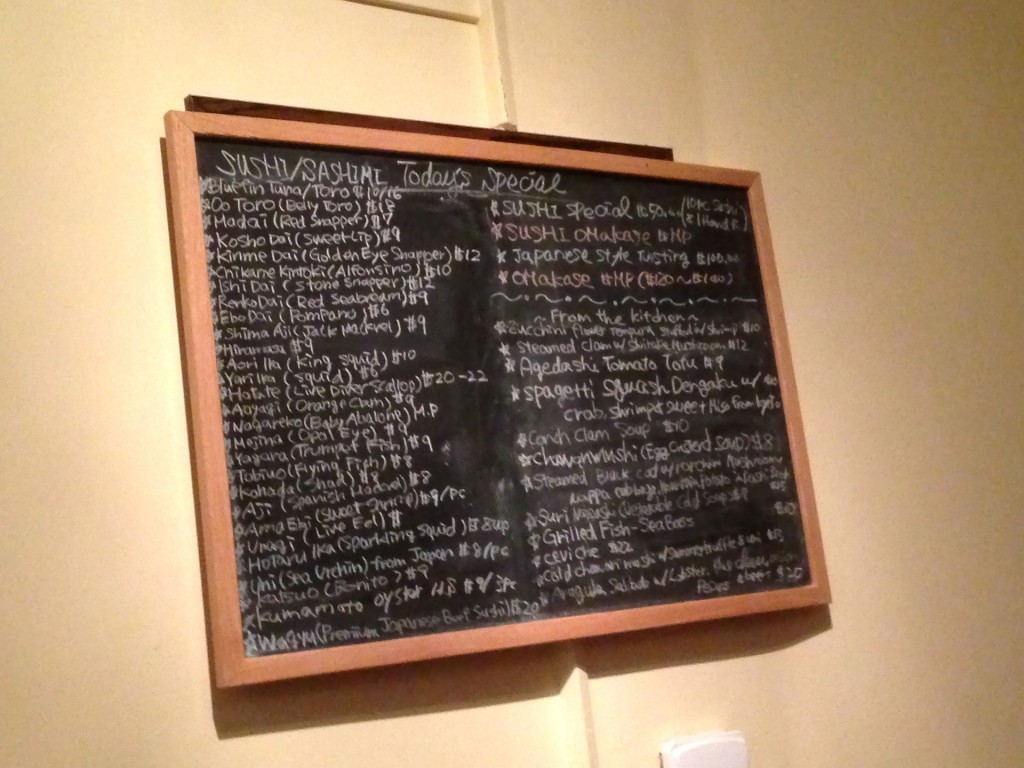
Without further ado, here’s what we had over the course of 3+ hours…
1. Suri nagashi, a cold vegetable soup of potato, cauliflower, and winter melon, with raw oyster and lily bulbs: The soup was smooth, creamy, and mellow, punctuated by the brininess of the oyster.
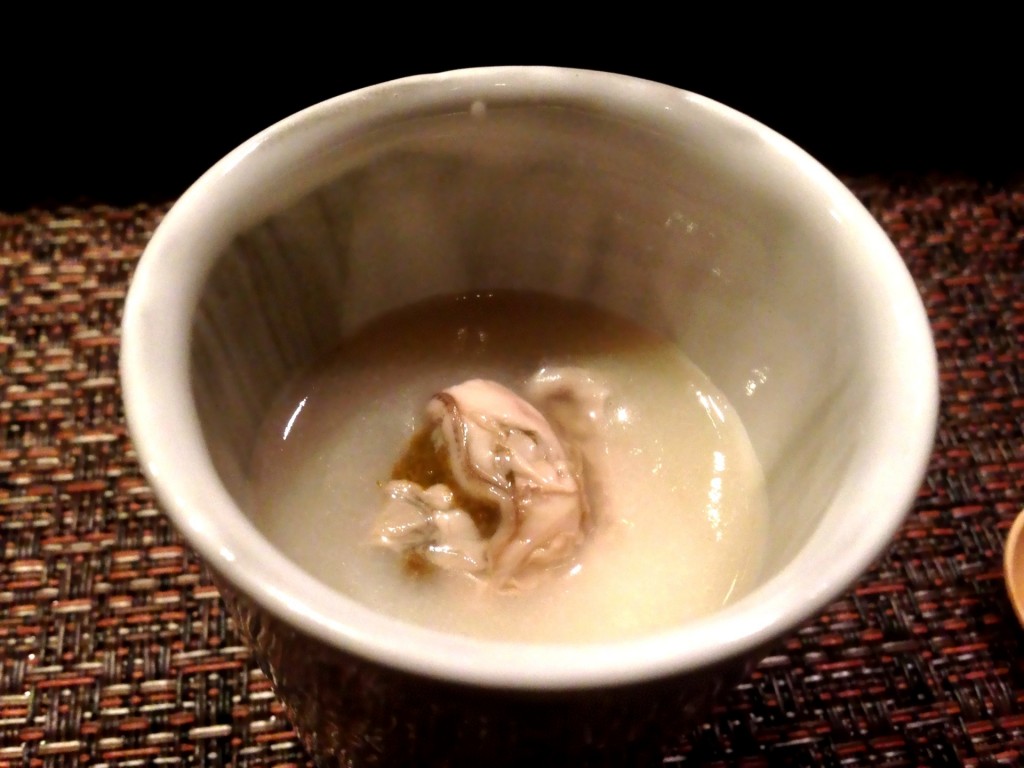
2. Cold chawanmushi, a steamed egg custard, with uni (sea urchin) and summer truffles: The bold flavors of the truffles and uni neither competed with each other nor overpowered the egg; a very well balanced dish.
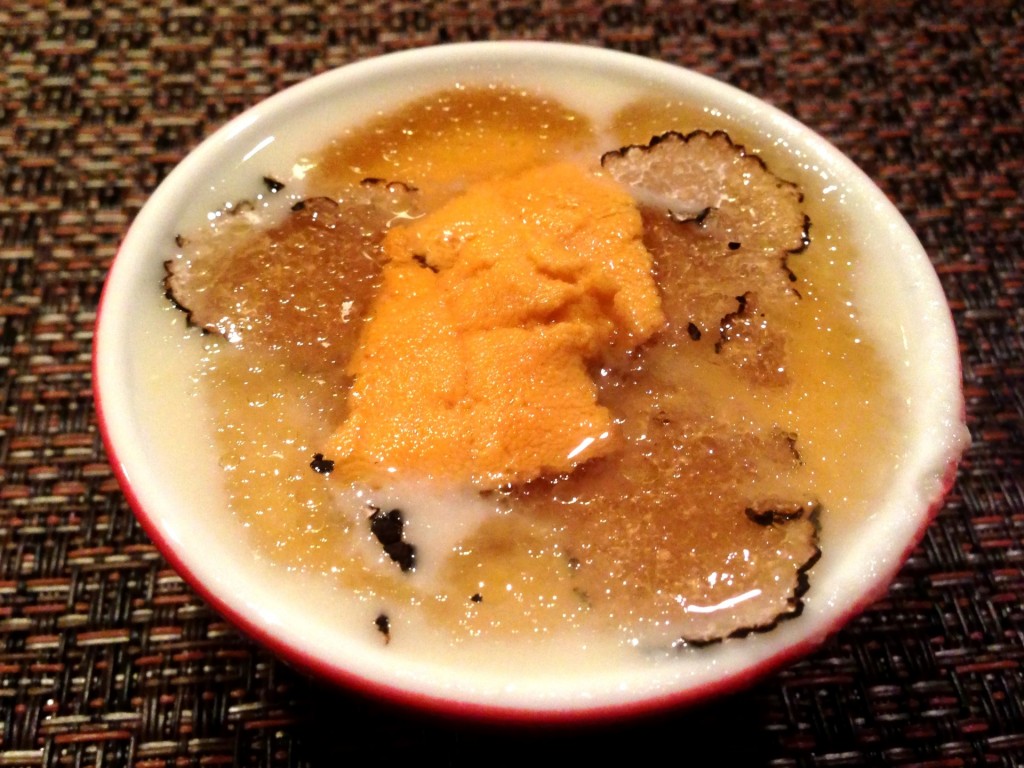
3. Zensai, an assortment of hors d’oeuvres consisting of tai (red sea bream) in plum sauce, sazae (turban shell conch), ankimo (monkfish liver) mousse w/caviar, purple potato and goat cheese “truffle” w/dried persimmons, hotaru ika (firefly squid), and a house-made soy-sesame tofu: A fantastic variety of flavors and textures, the standout was the soy-sesame tofu, which was creamy and packed with sesame flavor, but still had a gentleness to it.

4. Tako, octopus, with a marinated tomato and lily bulb: The inner flesh of the octopus was supple and tender, while the outer layer was gelatinous. The tomato had a strong vinegary kick, but the dashi also came through.
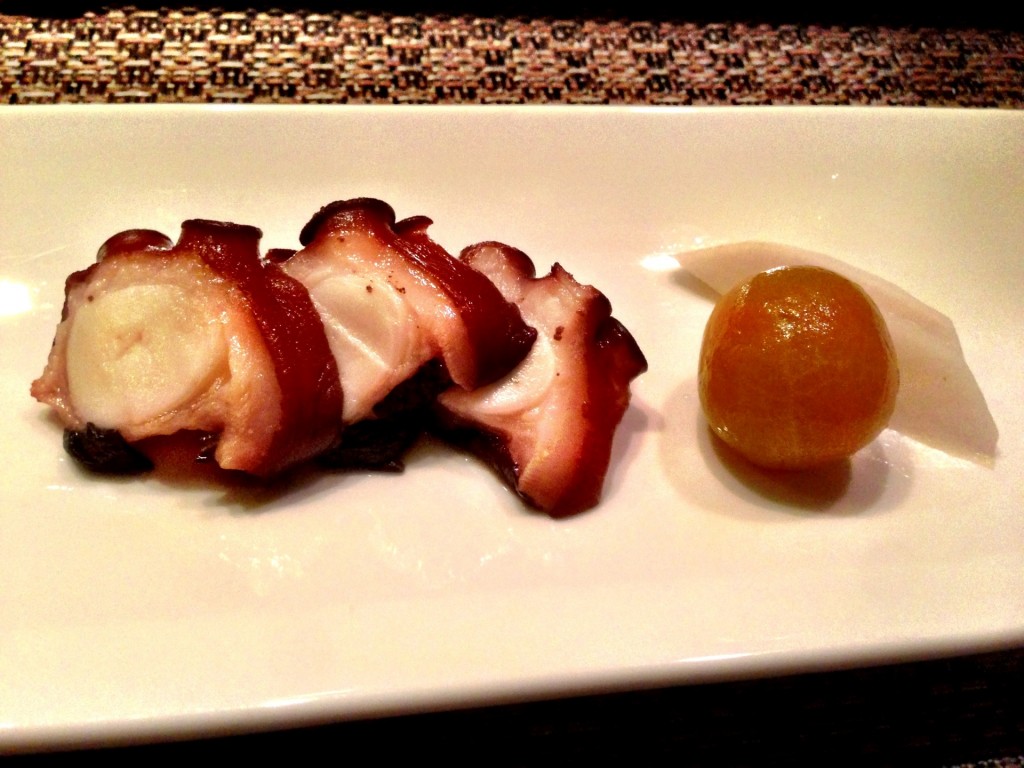
5. Assorted sashimi consisting of shimaaji (striped jack), tobiuo (flying fish), honmaguro akami (lean bluefin tuna), yagara (trumpet fish), and aji (horse mackerel): Shunji showcased the fish well, placing different varieties next to each other, and letting each fish’s inherent qualities contrast naturally with the next.

6. Ika somen, squid noodles, in house-made dashi with shredded nori, and grated fresh wasabi and ginger: The ika had just the right amount of chewiness, and the combination of Shunji’s incredible dashi with the fresh wasabi and ginger made this a delightfully refreshing dish.
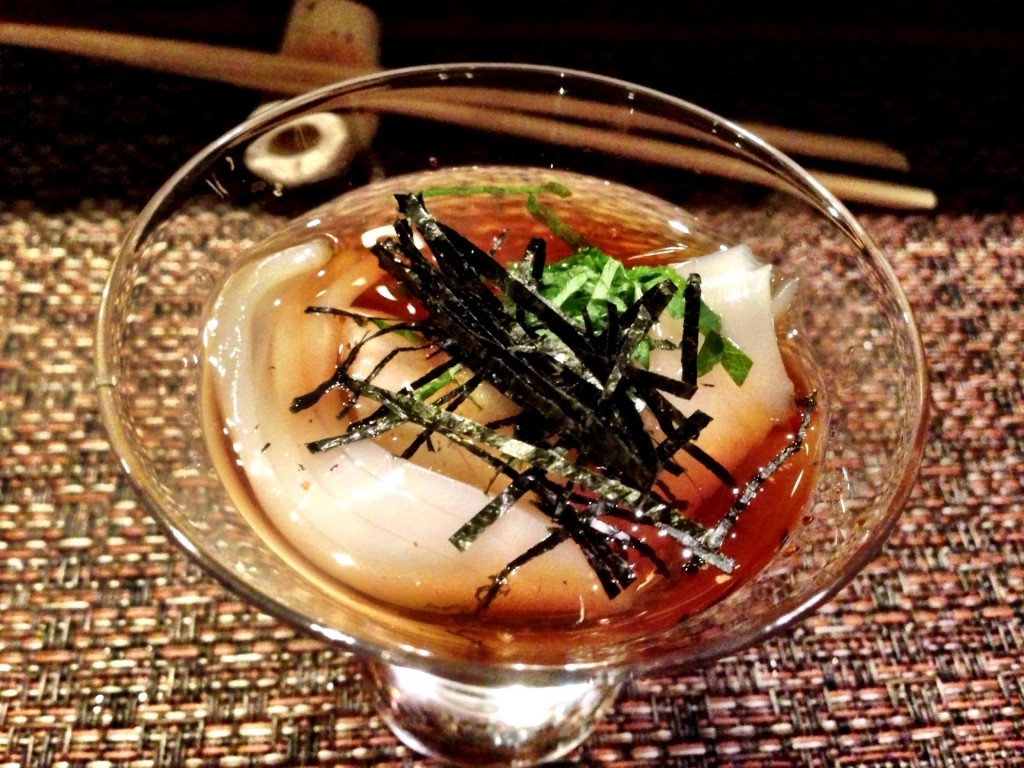
7. Amaebi tartare, live sweet shrimp, with truffles, truffle oil, and bafun uni (sea urchin from Hokkaido): The truffle oil was likely house-made with real truffles, as it included specks of the fungus, and didn’t have the typical truffle oil taste. Shunji encouraged us to take a bit of tartare, a bit of uni, and eat them together with the crispy fried shrimp heads. Probably the best dish of the night.

8. Sakura ebi, cherry blossom shrimp: The diminutive shrimp were briny, delicate, but with a bit of chew. Simple.

9. Red snapper soup, in a base of thickened dashi, with sliced shiitake mushrooms, and carrots or perhaps burdock root: Reminded me of starchy geng soup, but more refined. The snapper was perfectly cooked. (Does anyone know the Japanese name for this dish?)

10. Mero yaki, grilled Chilean sea bass, with a yamamomo, mountain peach: A staple dish at Shunji, with a steady rotation of fish; I’ve had grilled tai, sawara (king mackerel), and others here in the past. The fattiness of the mero really set it apart from the others.

11. Akaisaki kobujime, red bass wrapped in kombu: This preparation is usually done with hirame (halibut), but works well with tai and other shiromi (white fish), including this one. The kombu imparts salinity and umami to the fish. (I was a bit eager with the first piece of nigiri and ate it before taking a photo. Thanks Chris for letting me use yours!)
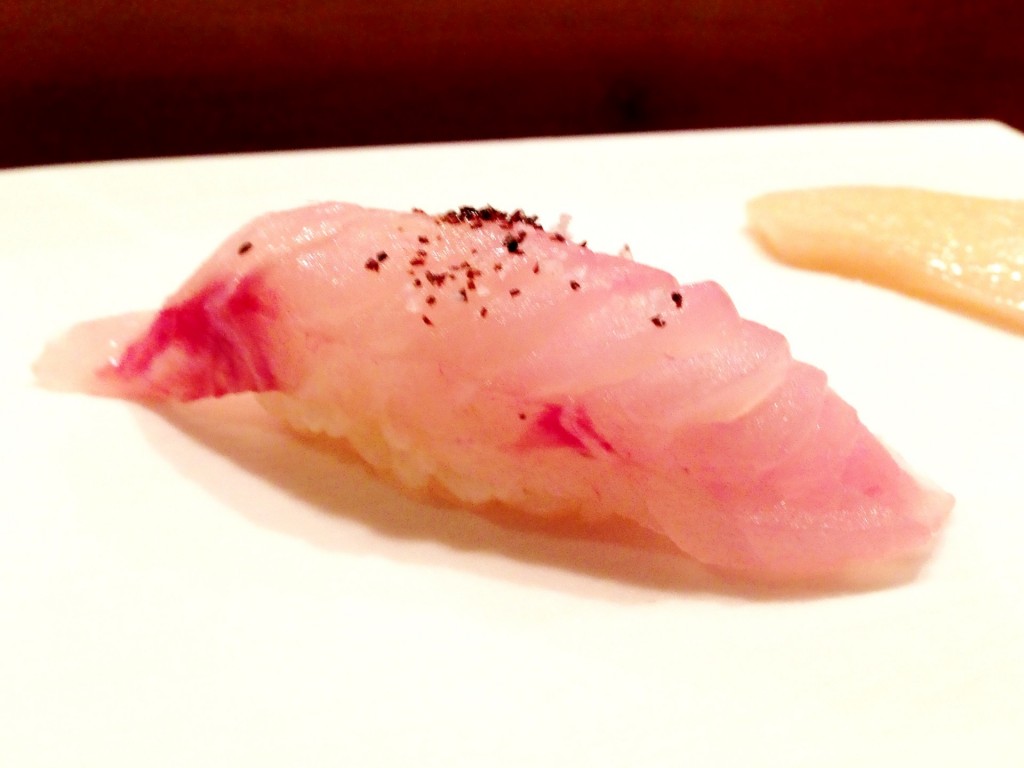
12. Mejina, opal eye, also known as rudder fish or largescale blackfish: Another shiromi similar to tai, with a slight nuttiness and a little more chew.
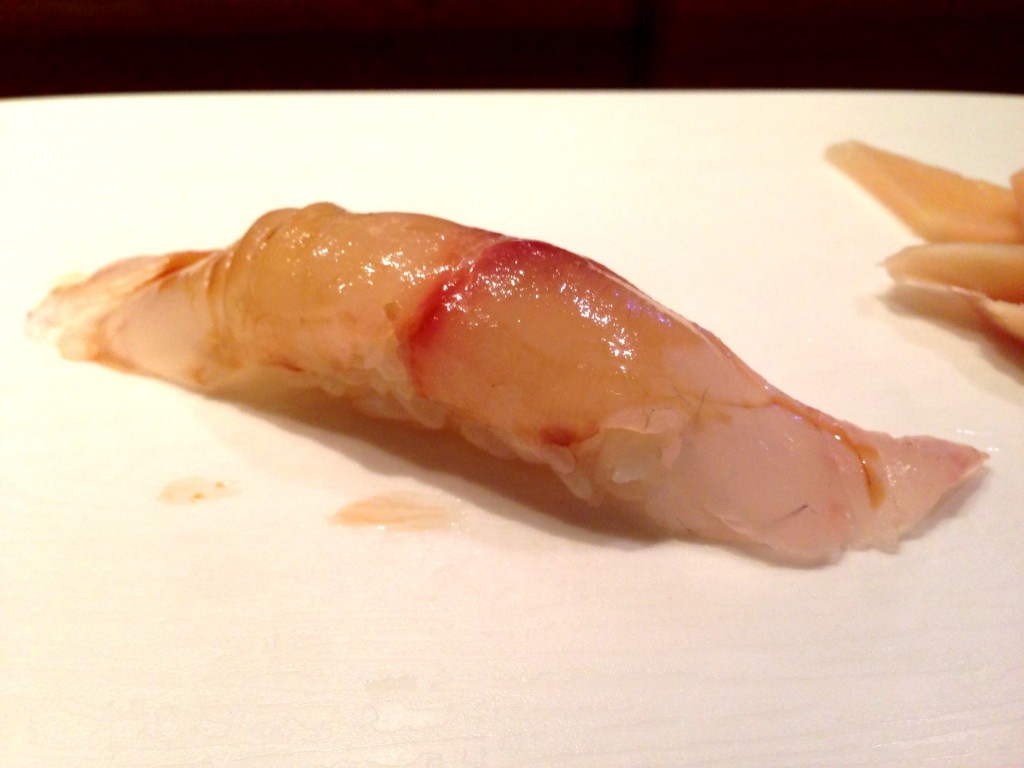
13. Marinated salmon, one of the house specials: Salmon is not a fish used in traditional edomae sushi. Shunji takes his and marinates it in his house-made dashi. My wife’s favorite, and one of my two favorite salmon sushi preparations, the other being Kiriko’s house-smoked salmon.

14. Honmaguro akami, lean bluefin tuna: This was a fairly prototypical specimen.

15. Ootoro, fatty tuna belly, presumably from the same bluefin tuna above: This is a rare treat, as I’ve generally just had chutoro, the less fatty cut of the belly. It nearly melts in your mouth, yet still has a substantial mouthfeel, but without the gristle that is sometimes present in chutoro.
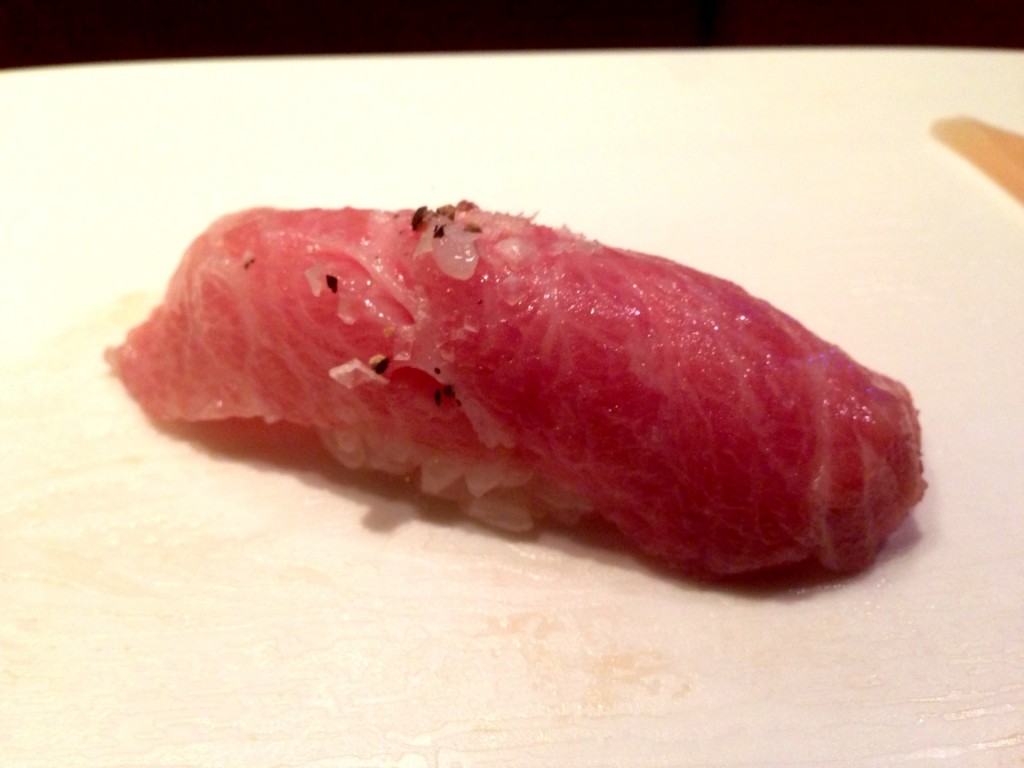
16. Saba, mackerel, lightly marinated: This is not the typical pickled-to-death mackerel sushi at lower-end restaurants. Quite mild for hikarimono (shiny-skinned fish).

17. Live hotategai, diver scallop, shucked in front of us: Incredibly fresh, plump, and sweet.

18. Chutoro, medium-fatty tuna belly: It’s hard to follow ootoro, but I’d rather have it than not. It has a little more chew, but still incredibly tender and with no gristle.

19. Hiramasa, yellowtail amberjack; Shunji overheard us talking about the fish and gave us a small slice to taste. It was delicate and fatty, but without being overly tender and “melt-y”.
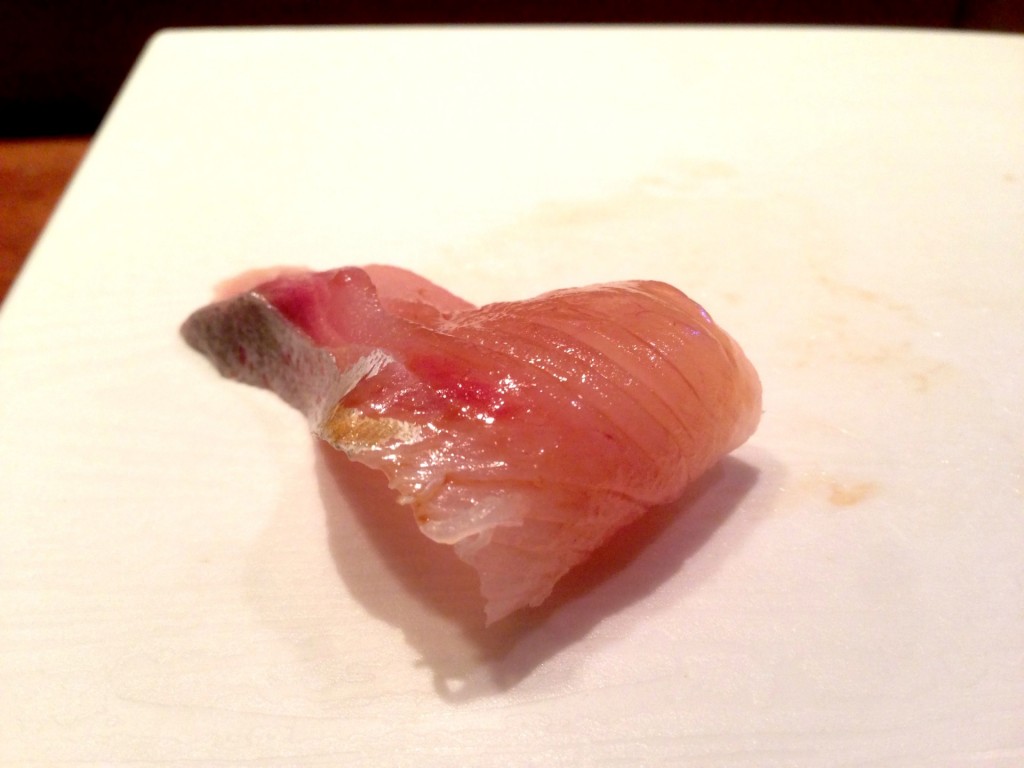
20. Unadon, live freshwater eel rice bowl: Shunji had posted a picture on Facebook of the eel swimming in a tub earlier that day. The tare (sweetened shoyu-based sauce) on the unagi was subtle, not cloying, with just enough to seep slightly into the rice without overpowering the dish. A perfect preparation.

21. Ikura, salmon roe: If you cannot have fresh ikura, which Ken does serve at Kiriko when in season, Shunji’s ikura marinated in his house-dashi, is the best out there. Rather than being sticky, shriveled, and over-salted, the roe is “brined” in the dashi, resulting in perfectly round and plump eggs bursting with sweetness.

22. Kanpyo maki, calabash roll: A traditional end to the sushi course, the kanpyo is a gourd that is dried in strips and then marinated in a mixture of sugar, soy sauce, and mirin (rice wine), which gives it a mild, sweet taste.
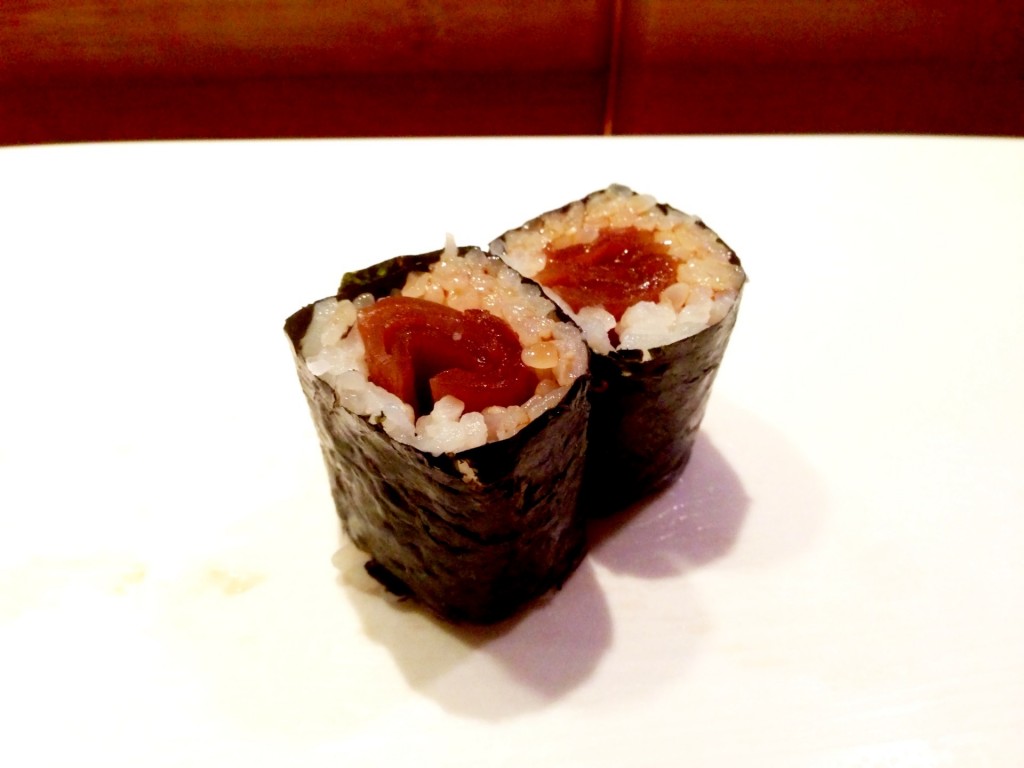
23. Shrimp head misoshiru: The heads were not deep fried before being put in the soup, so they were a little more difficult to eat, but was a delicious addition to the clean and light miso.
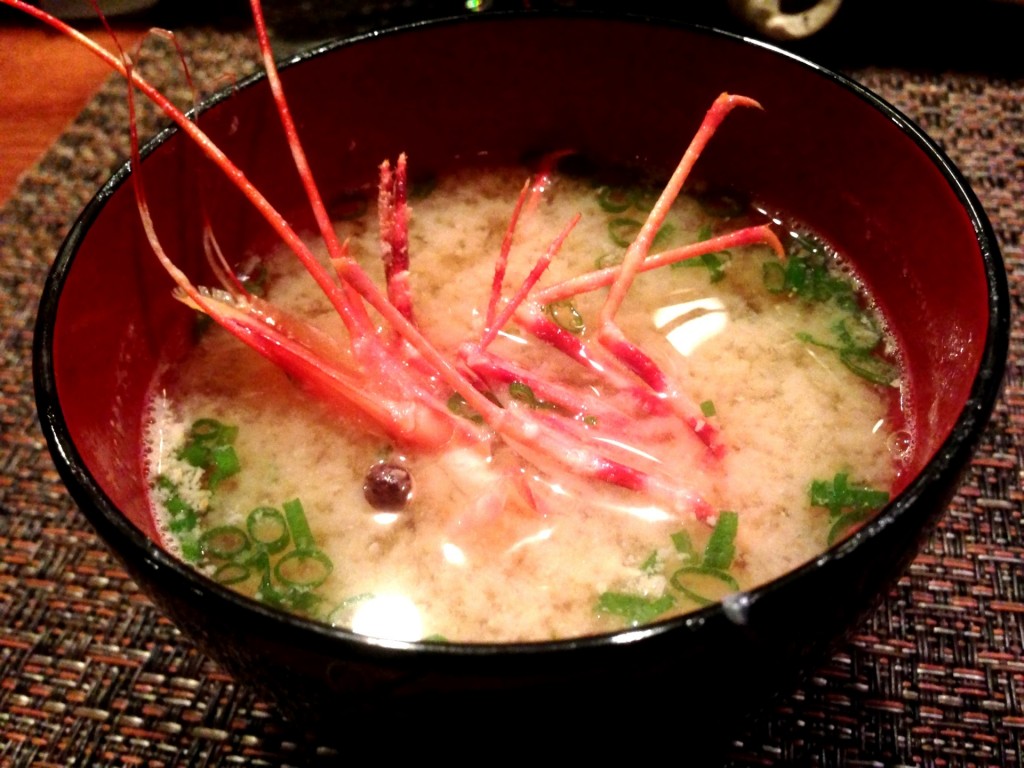
We finished our evening with a cup of hojicha, a mild green tea typically served at the end of a meal. We thanked Shunji and Yuko and the rest of the staff, and as we walked back to our respective cars, we all agreed that Shunji’s position on JGold’s 101 was very well deserved and looked forward to returning sooner rather than later!
Update: Not to go all TMZ, but two things I forgot to mention…
First, a large group was sitting at a table behind us during most of our meal. Shunji was preparing an epic sashimi platter for them when we came it. It just started off with the head of a tobiuo:
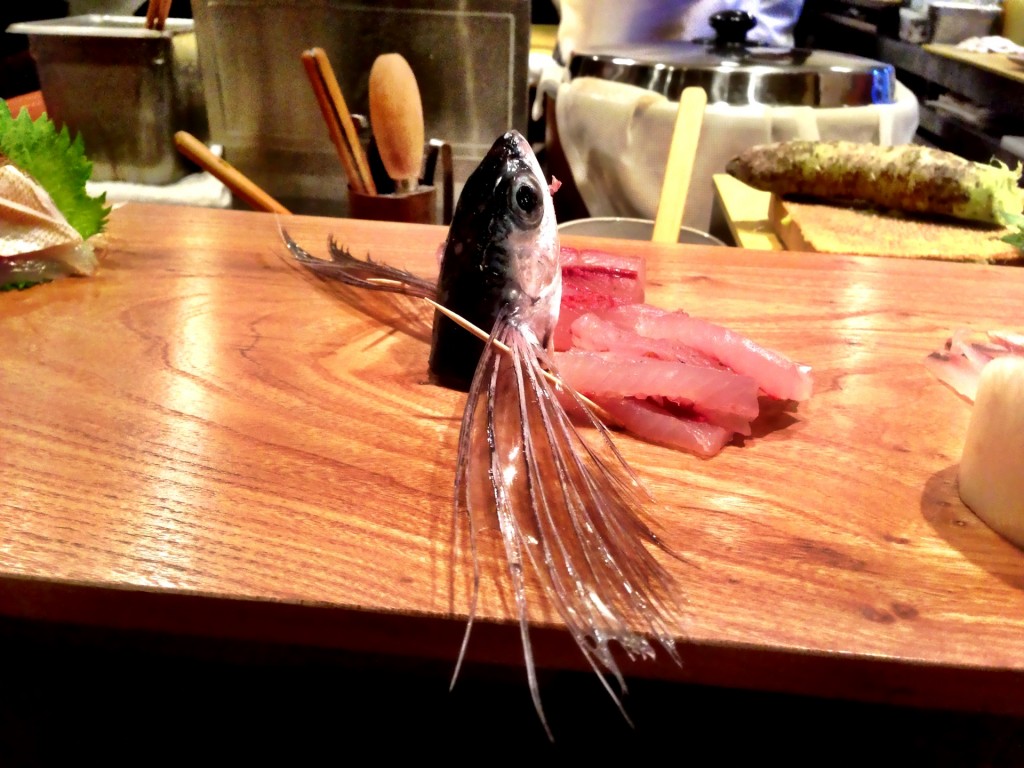
Then it grew to include the heads of the yagara and many, many amaebi, among other seafood:
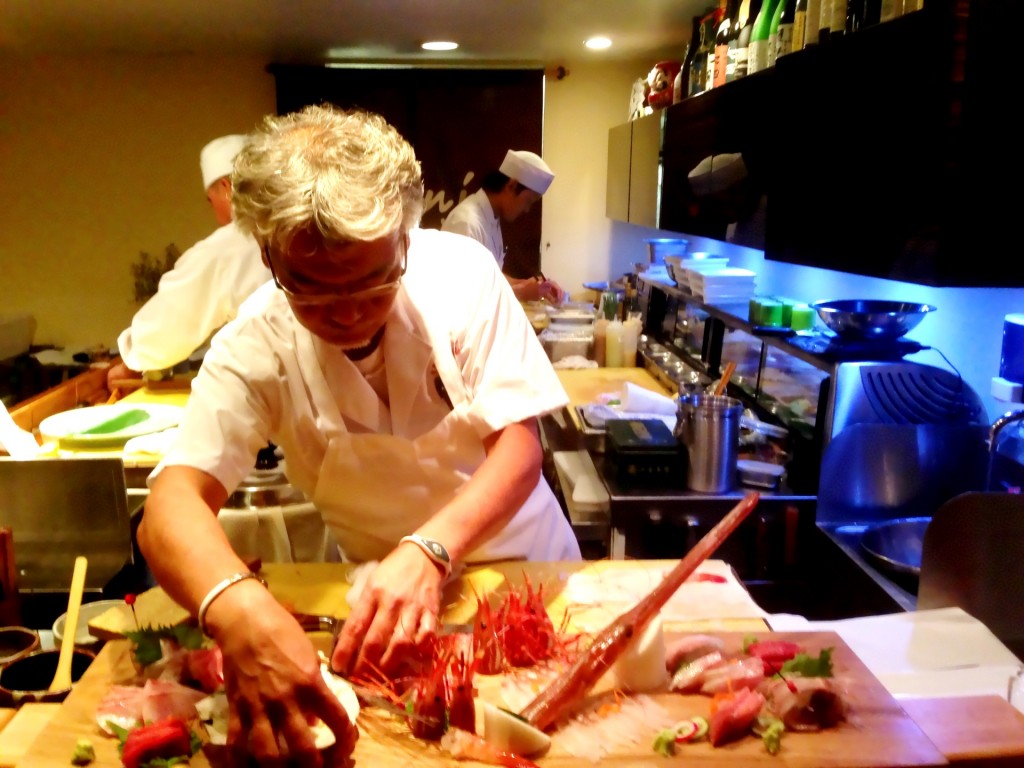
Turns out at the table were Adam Fleischman and Raphael Farasat, founders and CEOs of the UMAMI empire and of TRUFFL, respectively. The latter posted an instagram of the finished platter later that evening, but here’s Shunji putting on the final touch:

The group also ordered some wagyu nigiri. The bottom row is lightly seared:
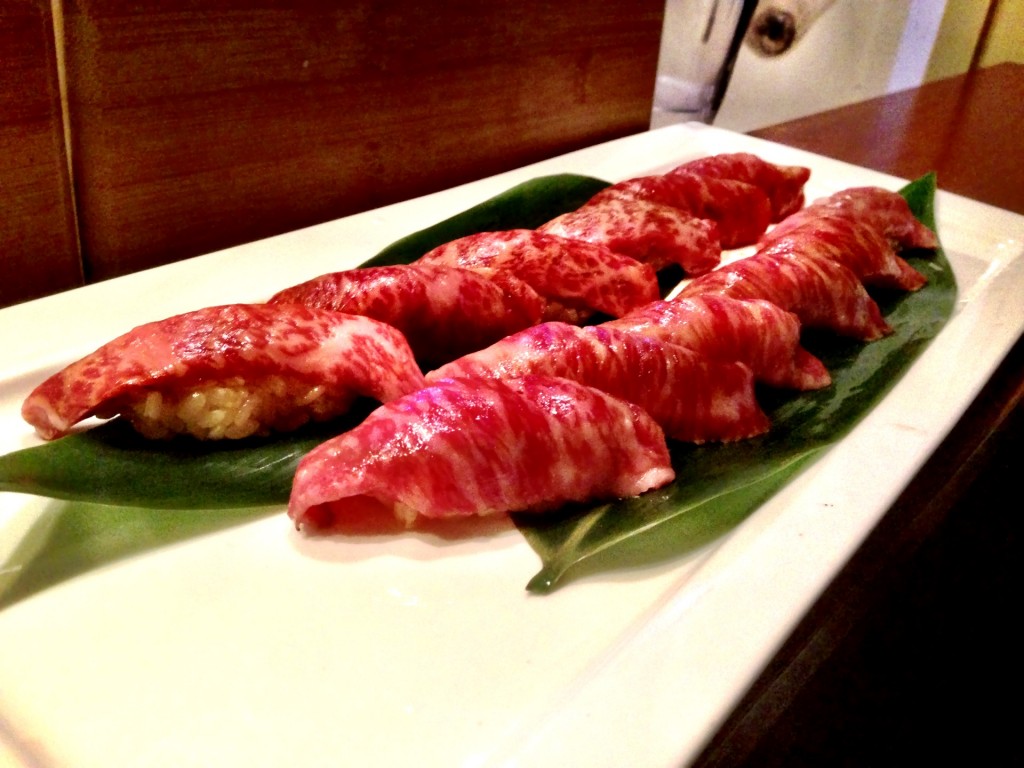
Second, one of the Tsujita ANNEX chefs came in toward the end of our meal. Apparently he was celebrating his birthday! Chris, being the Tsujita rockstar that he is, got a double-take and happy greeting from the noodle chef! :-)
Shunji had mentioned to us in a past visit that he got to preview the miso ramen at the Annex before it became officially available (and two days later, nixed from the menu). So of course he had to playfully give the chef a hard time about that while we were all there.
—–
Shunji Japanese Cuisine
12244 W Pico Blvd
Los Angeles, CA 90064
(310) 826-4737
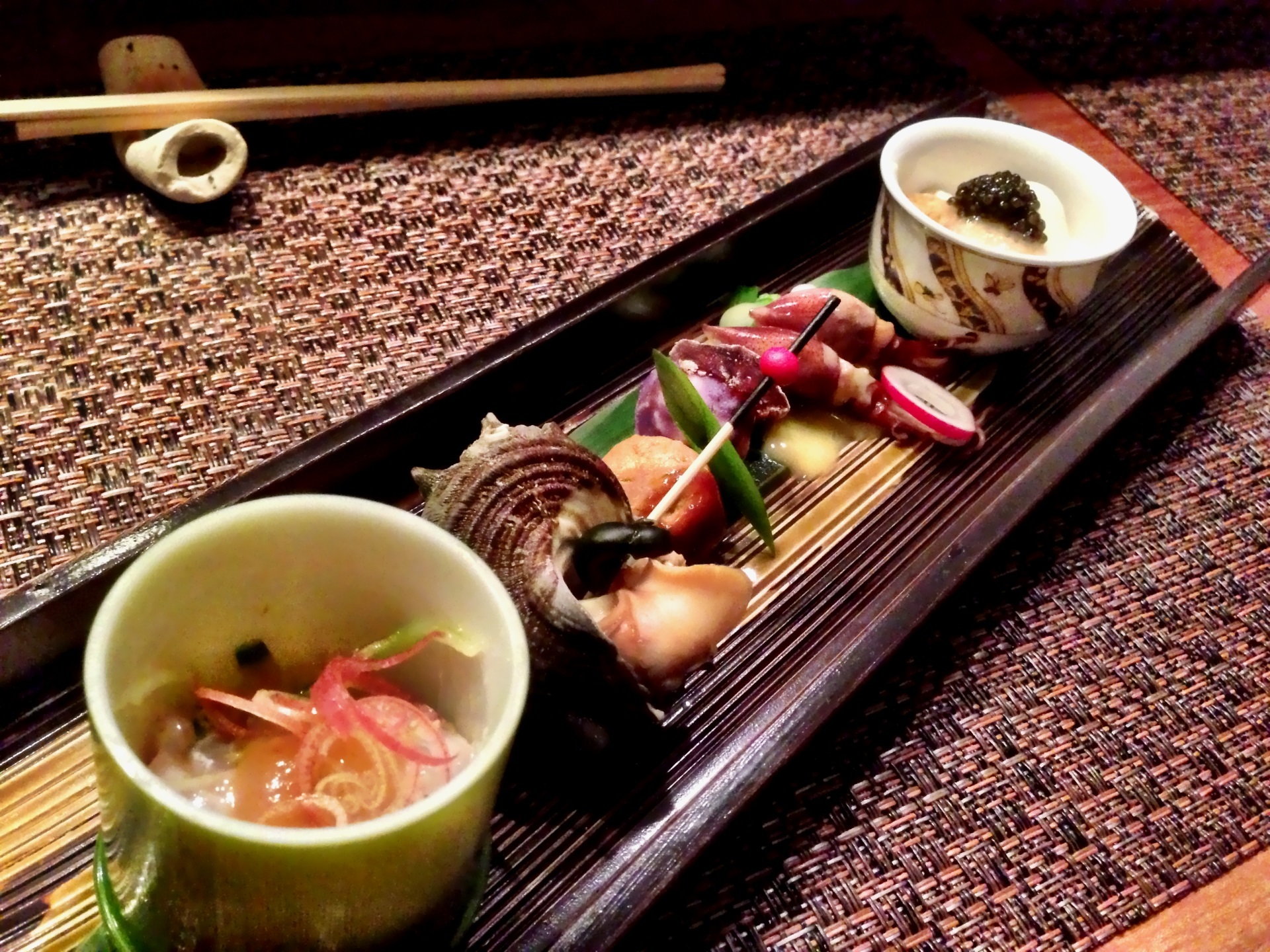
Leave a Reply